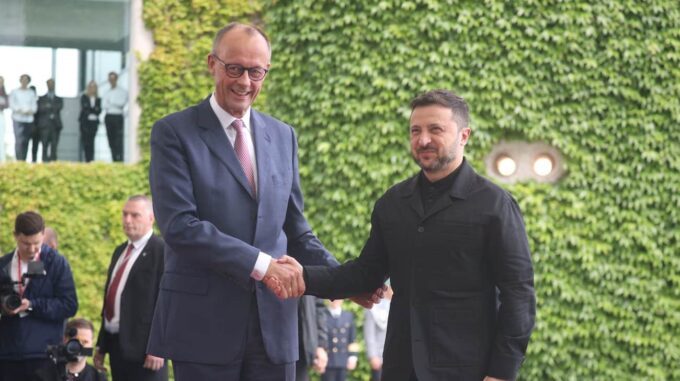Germany does not cease or restrict its military support to Ukraine; on the contrary, it is strengthening it, stated Chancellor Friedrich Merz during an official press conference in Berlin

During a joint meeting with Ukrainian President Volodymyr Zelensky, the head of the German government confirmed that the country continues and expands military deliveries to Ukrainian defenders. The most notable signal was the announcement of significant funding for the Starlink system and plans to purchase Ukrainian long-range weapon systems capable of striking targets at distances of several hundred kilometers. According to Merz, the German government does not plan to openly disclose all details of upcoming deliveries but emphasized: "I can affirm — military aid to Ukraine will not only be continued but also significantly expanded to ensure effective defense against Russian aggression. For this, we allocate a substantial portion of funds to the Starlink system, which has already become an important tool in Ukraine's fight for independence." The Chancellor also highlighted that German ministers of defense from both countries will sign a joint declaration the following day regarding the purchase of Ukrainian long-range weapon systems produced in Ukraine. It is important to note that Merz emphasized that Ukraine should have no restrictions on the use of long-range weapons. According to him, the country must have the full opportunity to defend itself and not be limited in the use of armaments that will enable it to effectively oppose the aggressor. Meanwhile, Ukrainian President Volodymyr Zelensky expressed satisfaction with the new agreements and investment projects in the production of weapons directly in Ukraine. "We welcome the development of joint projects, particularly in the production of drones and other weapon systems," he noted. Zelensky added that the countries agreed on financial support for existing and new manufacturing initiatives to increase the quantity of necessary weapons and equipment and ensure their rapid deployment at the front. He specifically stressed: "We aim for weapon production in Ukraine to become more extensive. This is a strategic objective, and we will do everything possible to realize it." On May 26, Chancellor Friedrich Merz made a high-profile statement that once again raised the issue of restrictions on the use of long-range weapon systems. He said that "the restrictions and limitations previously in place regarding strikes on Russian territory no longer apply." Merz reported that the United States, the United Kingdom, France, and Germany removed these restrictions several months ago, and now Ukraine has the right to use long-range weapons to defend itself, including in confrontations within Russian territory. At the same time, Vice-Chancellor Lars Klingbeil from the Berlin government stated that no new decisions or amendments regarding the lifting of restrictions had been adopted within the framework of the existing coalition agreement. According to him, "today we have no new agreements on changing the course regarding the use of long-range weapons against Russia." Nevertheless, experts and diplomatic sources emphasize that the policy of supporting Kyiv remains open and deliberate, with current decisions made by governments without public compromises, taking into account the security and strategic interests of Europe. Overall, these statements indicate a growing support from Berlin and other Western partners for Ukraine in its confrontation with Russian aggression. The focus is on both military aid and targeted efforts to produce weapons within Ukraine. This creates a new dynamic in the cooperation between countries that aim to ensure stability and security in the region, while also demonstrating their readiness to support Ukraine in its fight for independence and territorial integrity.

